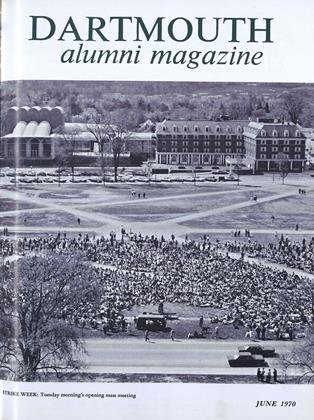FEW who witnessed the frenzied activity since President Nixon's address on April 30 could deny the intensity and importance of the educational experience which occurred at Dartmouth. At a time when the traditional structure of the liberal arts institution seemed no longer adequate to the moral convictions of members in most academic communities, Dartmouth responded with a truly remarkable alternative. The regular courses and classes were abandoned; their place was taken by a series of workshops (nearly 100 in the first week) which more than compensated for the suspension of normal academic work.
Several of these workshops, such as Jonathan Mirsky's and Steve Stone-field's discussion of the Indochinese War and the Canvassing Committee's workshop on the tactics and techniques of canvassing attracted audiences of 1500 people. Others jammed into the half-dozen or so lecture halls everyday to hear about our foreign policy, economic imperialism, political repression, racism, environmental destruction, the draft, and more. Without exception these workshops felt an enthusiasm for learning that is rare in any classroom situation.
What is sadly lacking in the classroom, an eagerness to participate and a visceral commitment to the subjects, found fulfillment in the free-flowing workshops. The lamentable leit-motif of standard education, in which an instructor's knowledge is passed on to notebooks without ever touching the minds of students (paraphrased from George Leonard's Education and Ecstasy), was simply overcome by the immediacy of the material and the intensity of interaction in the Strike workshops. With the tyranny of grades and requirements overthrown, an atmosphere in which, as one faculty member put it, "the College fulfilled its function by providing the students with the opportunity to make an exciting and successful educational experience. In a more obvious and real way than ever before, people on campus were suddenly motivated to know and to act."
The "new" Dartmouth, as many call it, manifested an astounding vitality which must be maintained. The "old" Dartmouth seemed sterile and moribund by contrast. The Strike did not change the world, but it did change Dartmouth into an exciting place - one deserving of unprecedented pride. Substantial activity is now directed toward educational reform, so that the "new" Dartmouth can be a lasting reality.
 View Full Issue
View Full Issue
More From This Issue
-
 Feature
FeatureFor Want of a Better Word They Called It a Strike
June 1970 By DAVID MASSELLI '70 and WINTHROP ROCKWELL '70 -
 Feature
FeatureSix Professors Reach Retirement
June 1970 -
 Feature
FeatureNew Environmental Studies Program To Be Launched in the Fall
June 1970 By ROBERT B. GRAHAM '40 -
 Feature
FeatureThe Class Officers Weekend
June 1970 -
 Article
ArticlePRESIDENT KEMENY'S RADIO TALK
June 1970 -
 Article
ArticleWhat the Workshops Meant
June 1970 By GUY DE MALLAC-SAUZIER
Article
-
 Article
ArticleVARIATIONS IN THE SCHOLARSHIP OF INDIVIDUALS
August 1924 -
 Article
ArticleAlumni Statistics
May 1933 -
 Article
ArticleDARTMOUTH IN BRIEF
February 1934 -
 Article
ArticleAlumni Fund Statement: 1947
February 1948 -
 Article
ArticleDartmouth’s Arctic Consultant Dies at 82
OCTOBER 1962 -
 Article
ArticleTuck School
JANUARY 1959 By R. S. BURGER

